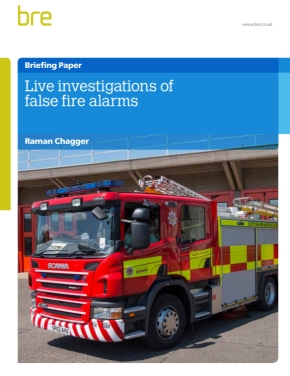Live investigations of false fire alarms
Live investigations of false fire alarms was written by Raman Chagger and published by BRE in December 2015. Recommendations made as a result of this project can help to significantly reduce the occurrence of false fire alarms.
Fire detection and fire alarm systems (FDFAS) are used to provide early warning of fire in order to alert the local Fire and Rescue Service (FRS). FRS attendance at fires saves lives, prevents injury and reduces associated property damage costs.
However, false alarms attribute to estimated losses of around £1 billion a year, resulting in disruption and loss of productivity for businesses. False alarms have the potential to divert fire and rescue services away from real fires, and also reduce the confidence of the general public in fire alarms. Despite this there is no single organisation responsible for investigating false alarms or providing guidance on reducing them.
This research aimed to identify the fundamental causes of false fire alarms, utilising a fire alarm industry expert to investigate false alarms as they occurred in the field in the greater Glasgow area. A comprehensive online questionnaire containing 124 questions was developed to enable the fire alarm investigator to record all details of the false alarms attended. This form of live investigation of false alarms had not previously been attempted. The fire alarm investigator assisted Scottish Fire and Rescue Service crews as they attended live callouts and, following a comprehensive investigation, completed online reports for each false alarm.
Data from his accounts and from 65 false alarm reports, gathered from November 2014 to April 2015, were analysed and 35 recommendations were made. These can significantly reduce false alarm occurrences and contribute to the greater integrity and reliability of fire detection systems.
The recommendations were made across nine different stakeholder groups, ensuring that fire and rescue services, fire risk assessors, business owners, fire alarm contractors, trade associations and others can all play their part in collectively reducing false alarms in the UK.
The contents of the briefing paper are:
- Summary.
- Abbreviations and glossary of terms.
- Introduction.
- Methodology.
- Summary of data gathered.
- Findings and recommendations.
- Future work.
- Conclusions.
- References.
The free briefing paper can be downloaded at: https://files.bregroup.com/research/Live-Investigations-of-False-Alarms_2015-December.pdf
[edit] Related articles on Designing Buildings Wiki
- BRE articles on Designing Buildings Wiki.
- Carbon monoxide detector.
- Fire detection and alarm system.
- Fire protection engineering.
- Fire.
- Heat alarm.
- Ionisation smoke alarm.
- Multi-sensor alarm.
- New requirements for fire detection and alarm network systems IP 12 13.
- Optical smoke alarm.
- Over £1 billion lost every year due to false alarms.
- Project SHOUT.
- Smoke alarm.
- The causes of false fire alarms in buildings.
Featured articles and news
Infrastructure that connect the physical and digital domains.
Harnessing robotics and AI in challenging environments
The key to nuclear decommissioning and fusion engineering.
BSRIA announces Lisa Ashworth as new CEO
Tasked with furthering BSRIA’s impressive growth ambitions.
Public buildings get half a million energy efficiency boost
£557 million to switch to cleaner heating and save on energy.
CIOB launches pre-election manifesto
Outlining potential future policies for the next government.
Grenfell Tower Inquiry announcement
Phase 2 hearings come to a close and the final report due in September.
Progress from Parts L, F and O: A whitepaper, one year on.
A replicated study to understand the opinion of practitioners.
ECA announces new president 2024
Electrical engineer and business leader Stuart Smith.
A distinct type of countryside that should be celebrated.
Should Part O be extended to existing buildings?
EAC brands heatwave adaptation a missed opportunity.
Definition of Statutory in workplace and facilities management
Established by IWFM, BESA, CIBSE and BSRIA.
Tackling the transition from traditional heating systems
59% lack the necessary information and confidence to switch.
The general election and the construction industry
As PM, Rishi Sunak announces July 4 date for an election.
Eco apprenticeships continue help grow green workforce
A year after being recognised at the King's coronation.
Permitted development rights for agricultural buildings
The changes coming into effect as of May 21, 2024.























